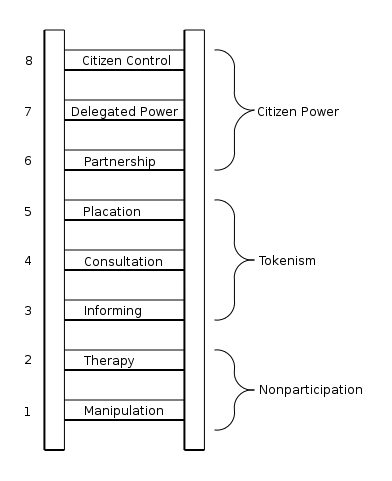Introduction
For effective decision-making within the country, the contribution of residents plays a crucial role and landlords should consider the needs and demands before rendering them house for rent or purchase. Further, they should accommodate the structure with the best of the equipment so that the satisfaction level increases up to the utmost level. This report emphasizes on involvement of residents in the decision-making process so that the residents or tenants get the best of the services. Further, this report also gives an understanding of ARNSTEIN'S LADDER OF PARTICIPATION where the contribution of the tenant is taken into consideration in the decision-making.
Need to Consult Directly With Our Experts?
Contact UsReasons For Involving Residents In Decision Making
Hard-to-reach groups are the set mass of the people to whom the reach is difficult and individuals have to make a lot of effort for proper functioning. Reaching towards the government is the toughest decision to be made and housing service providers have to decide what changes they can implement in the society where they are staying. The involvement of residents plays a crucial role for the service provider in order to produce the quality of housing services. Further, there also exists reasons why major decisions have to be made on certain problems like overcoming inequality, improving efficiency, decreasing social tension, increasing social capital, and enabling major programme implementation such as estate regeneration. However, it is a complicated process because only few people are involved in order to achieve its costs and benefits. Further, some landlords consider their tenants in decision making whereas others avoid and take decisions on their own. It is necessary for tenant and landlords to opt for questioning and an open approach for making effective and efficient decisions (Benoit and Phillips, 2005). The questioning approach consists of exchanging questions between the tenant and the service provider. The open approach on the other side consists of a broader concept where the tenant and landlord discuss each and every aspect of the renting service. There exist housing organizations in London whose main role is to involve residents in decision-making. This is generally to give the best of the services to the tenants. These housing organizations works on behalf of the government and give the best of the facilities to the citizens staying there.
Further, the involvement of local bodies i.e. government also plays a significant role in order to give residents effective service. The government has to take some effective measures to protect the rights of the tenants so that they get comfortable with the amenities given to them. Further, with the involvement of tenants, housing organizations can:
- Involve residents to improve the services and give value for money to the citizens.
- At times, involving residents generally makes it much more difficult for the housing organization because each and every individual has its own demand and is generally impossible to fulfil all at a particular time.
Furthermore, landlords involve the tenants in decision making and their effective contribution falls into three major categories. These give better accommodation to tenants
- increase the satisfaction level of service user's
- development of social assets. Moreover, housing organization also needs to be clear regarding their involvement and planning in the activities.
Activities like carrying out construction work at good locations, cleaning the society for better help of self and tenants, etc. Further, they are also responsible for communicating the stated aims and objectives to the residents. However, if the reason for involving the residents is not clear, then it will lead to confusion and unrealistic expectations (Barbour, 2005). However, in order to solve this problem, it is necessary for both landlords and tenants to choose the questioning and open approach method. Further, there is also required a great amount of honesty as to what activities have been designed for the residents and what is the relevancy of that particular activity. Whether they will be able to satisfy the individual's needs and demands or not.
Get our professional economics assignment help from the experts!
Moreover, housing organizations need to be engaged with the tenants in the same way as private business organizations try to connect with the customers to identify their desires. Apart from this, many housing organizations seek to include a large number of tenants in order to improve their accountability. Further, landlords also feel that enhanced accountability is generally more intangible as compared to service improvement. It is much more difficult for landowners to satisfy all the needs of the individual; because at times it affects the flow of capital within the society. A landlord who adopts the wider agenda generally believes that there is value in formal and informal interaction between the members and society.

Stuck with your Assignment?
Hire our PROFESSIONAL ASSIGNMENT WRITERS and Get 100% Original Document on any Topic to Secure A+ Grade
Get Assignment Help
However, the new Housing Corporation involves the policy which is required by business associations to produce a partnership with the residents (Benoit and Phillips, 2005). Further, organisations can check this with the help of the impact assessments which will generally evaluate different evidences that will show the degree to which service has been improved.
Arnstein's Ladder Of Participation
Participation in housing services generally means mechanisms which are available for individuals to express their opinions so that they can make crucial decisions. Further, Arnstein's ladder of participation is also treated as a participatory decision-making process which majorly focuses on individual activities. It was formulated by Sherry Arnstein in the year 1969. It is a ladder of citizen partnership ranging from higher to lower. It shows the role of an individual when important decisions are undertaken. Further, this ladder shows eight levels of citizen participation which range from non-participation of tenants to full power to the citizens. The above-cited statement is the description of Arnstein's ladder of participation. The brief description of the same has been discussed down under:
Manipulation places individuals on the advisory board and their main is to cure and educate the participants. Further, citizens are educated with different agencies for development.
Therapy is non-performative and the main is to educate the participants to improve their efficiency towards decision-making (Abrams, 2010). Therapy also engages in different activities and involves various citizens in the planning and decision-making process.
Informing
It is one of the important points in legitimate participation and also emphasises the flow of information. Under this, no channels of feedback are present.
Consultation
It is also considered as a legitimate step towards the survey and it involves citizens for decision-making in the proper manner. Arnstein in this case founded it as a window dressing ritual.
Placation
It allows residents to advise the body at infinite times but they retain different power holders to judge the feasibility of suggestion given by the individuals.
Partnership
It shows that the power is distributed among the citizens and power holders. Moreover, the decision-making duties are shared between them only by forming joint committees.
Delegation
It is the second last level in Arnstein's ladder of participation which shows that residents hold a clear majority of the seats. They get the delegated power in order to make effective decisions (Collins and Ison, 2009). Further, the public has the dominating power in order to ensure the accountability of the programme.
Citizen control
At last, has lot of work to handle the entire job planning, policy making and managing of different programmes.
Further, this ladder helps the tenant to be in a commanding position and also comprises several steps so that changes can be seen in a dominating manner. Therapy, consultation, and delegation are the major components which eventually help in teaching the individual regarding the development process which will give them a peaceful life. Further, the mentality of the individuals differs from one person to another and they have their own perceptions in decision making.

From the above description, it is clearly evident that Arnstein's ladder of participation gives an overview of different ways through which individuals in a community can be involved in making effective decisions. Non-participative individuals assume that they are part of the decision-making process but eventually, they are not (White, 2009). Further, this report also gives a clear idea that individual participation plays a crucial role in the decision-making process. Further, Arnstein's ladder of participation helps organizations to attract hard-to-reach groups so that decisions are made with the best of opportunities that exist in the environment.
To get more details about online assignment help meet our experts.
References
- Abrams, L. S., 2010. Sampling ‘Hard to Reach ' Populations in Qualitative Research The Case of Incarcerated Youth. Qualitative Social Work. 9(4). pp.536-550.
- Barbour, R. S., 2005. Making sense of focus groups. Medical education. 39(7). pp.742-750.
- Benoit, C. and Phillips, R., 2005. Community-academic research on hard-to-reach populations: Benefits and challenges. Qualitative Health Research. 15(2). pp.263-282.
- Cinderby, S., 2010. How to reach the ‘hard to reach': the development of Participatory Geographic Information Systems (PGIS) for inclusive urban design in UK cities. Area. 42(2). pp.239-251.



 Company
Company


















